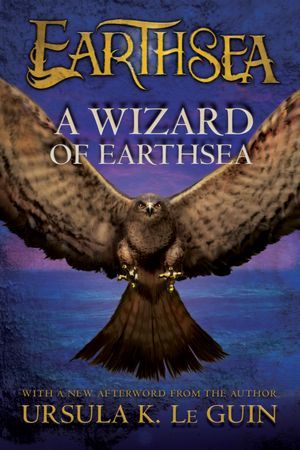Fiction
255 pages
Ged, the greatest sorcerer in all
Earthsea, was called Sparrowhawk in his reckless youth. Hungry for power and
knowledge, Sparrowhawk tampered with long-held secrets and loosed a terrible
shadow upon the world. This is the tale of his testing, how he mastered the
mighty words of power, tamed an ancient dragon, and crossed death's threshold
to restore the balance.
Completion: I had to read this for class (which is the only reason I
finished it). It wasn’t hard to read per se, but there wasn’t really anything
to keep me going either. Such as a shame, since I’ve only heard great things
about Ursula K. Le Guin and her writing.
Writing/Style: The
story is written in a very legend or fairytale-esque style. Because of this,
there is such a distance between the reader and the characters that it makes it
hard to know them and become invested in them. The writing itself feels
like a background chapter you might get on an already established character that we care about. Imagine if Dumbledore (minus the humor, cleverness, etc.) had a
rushed book about his childhood without us knowing Dumbledore as this amazing
wizardly father figure for Harry. Knowing J.K. Rowling, she would still probably manage to turn that into a good story, but I digress. This book just seems a little
backward, giving us the background chapter/story without purpose or interest.
Characters: The
characters felt like cardboard cutouts. I could never relate/sympathize/invest
in Ged, the main character. We seem to do get all the negative qualities about
him (anger, pride, etc.) without any of the positive qualities, quirks,
interests, and so on that would make us care or root for him. As well, we were often told things about characters and their relationships rather than following those story threads along. We get only a line or two before a character is announced to be the antagonist, and we are told that Ged and Vetch become great friends but I never see that or believe it.


Plot/Pacing: This book
felt like it was on fast-forward. As well, while I understand that Le Guin was
attempting to write something new and avoid certain cliches of fantasy, in the
end this book felt like the pinnacle of high fantasy stereotypes.
World-building/Atmosphere: It is clear that Ursula knows a lot about this world from the
geography to the different cultures; however, I the reader didn’t. Places and
cultures fly by so quickly and are so many that none had a lasting impression
on me. I never had time to really sink in and discover these interesting
tidbits because the pacing kept rushing the characters on and on like pieces on
a chessboard. This is a shame because I feel that if it had slowed down this world
could have been as interesting and thorough as Westoros from Game of Thrones
(well, maybe not that as good as Westoros, but just giving an example of another book that has a TON of information about places, cultures, lore,
etc.).
Sub-genres (Romance, Humor, Mystery, etc.): Due to the style, we did not get much in the way of
romance, humor, and mystery. All of those things can only be done well if we
know and care about the characters, but these elements seemed to have been
sacrificed in the name of style. However, if one would argue that there is a
mystery, then it was not well done because I saw the ending and message coming
from a mile away.
FINAL VERDICT: The style
keeps the reader at a distance, and the pace pushes the characters from one
scene to the next without much in the way of character development, humor,
romance, mystery, and so on. While there are some interesting aspects to this
novel, unless you particularly like a legend or fairytale-esque style of story,
I would give it a pass. Simply put, most modern readers expect more in the way
of character and plot development than what this book gives.

No comments:
Post a Comment